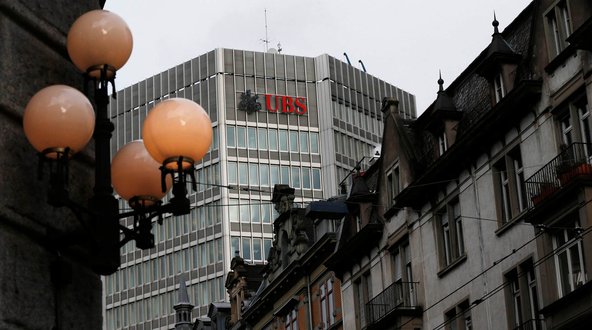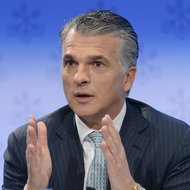 Michael Buholzer/ReutersUBS agreed to record fines to settle a rate-rigging case.
Michael Buholzer/ReutersUBS agreed to record fines to settle a rate-rigging case.
UBS, the Swiss banking giant, announced a record settlement with global authorities on Wednesday, agreeing to a combined $1.5 billion in fines for its role in a multiyear scheme to manipulate interest rates.
In a sign that officials are increasingly taking a hard line against financial wrongdoing, the Justice Department also secured a guilty plea from the bank’s Japanese subsidiary, sending a warning shot to other big banks suspected of rate rigging. The UBS subsidiary, which agreed to plead to a single count of wire fraud, is the first unit of a big bank to agree to criminal charges in more than a decade.
The cash penalties represented the largest fines to date related to the rate-rigging inquiry. The fine is also one of the biggest sanctions that American and British authorities have ever levied against a financial institution, falling just short of the $1.9 billion payout that HSBC made last week over money laundering accusations.
Related Links
 Documents: The F.S.A. report
Documents: The F.S.A. report- UBS E-Mails Show How Traders Gamed the System
- UBS Unit Is Said to Be Close to Guilty Plea in Rate-Rigging Scandal (Dec. 13, 2012)
The severity of the UBS penalties, authorities said, reflected the extent of the problems. The government complaints laid bare a scheme that spanned from 2005 to 2010, describing how the bank reported false rates to squeeze out extra profits and deflect concerns about its health during the financial crisis.
“The findings we have set out in our notice today do not make for pretty reading,” Tracey McDermott, the enforcement director for the Financial Services Authority of Britain, said in a statement. “The integrity of benchmarks,” she said, “are of fundamental importance to both U.K. and international financial markets. UBS traders and managers ignored this.”
The UBS case reflects a pattern of abuse that authorities have uncovered as part of a multi-year investigation into rate-rigging. The inquiry, which has ensnared more than a dozen big banks, is focused on key benchmarks like the London interbank offered rate, or Libor. Such rates are used to help determine the borrowing rates for trillions of dollars of financial products like corporate loans, mortgages and credit cards.
Libor Explained
 Walter Bieri/KEYSTONE, via Associated PressSergio P. Ermotti, chief of UBS.
Walter Bieri/KEYSTONE, via Associated PressSergio P. Ermotti, chief of UBS. Financial Services AuthorityTracey McDermott, the enforcement director for the Financial Services Authority of Britain.
Financial Services AuthorityTracey McDermott, the enforcement director for the Financial Services Authority of Britain.
In the UBS matter, the wrongdoing occurred largely within the Japanese unit, where traders colluded with other banks and brokerage firms to tinker with Yen denominated Libor and bolster their returns. During the 2008 financial crisis, UBS managers also “inappropriately gave guidance to those employees charged with submitting interest rates, the purpose being to positively influence the perception of UBS’s creditworthiness,” according to authorities.
In a series of colorful e-mails and phone calls, traders tried to influence the rate-setting process. “I need you to keep it as low as possible,” one UBS trader said to an employee at another brokerage firm in September 2008, according to the complaint filed by the Financial Services Authority. “If you do that,” the trader promised to pay “whatever you want. I’m a man of my word.”
As the employees carried out the alleged manipulation, they also celebrated the efforts, with one trader referring to a partner in the scheme as “superman.” “Be a hero today,” he urged, according the complaint by regulators.
The British and Swiss authorities released their complaints on Wednesday before the bank’s shares began trading in Switzerland. American authorities are expected to release their own complaints later Wednesday in Washington.
In a statement, UBS highlighted its cooperation with the investigation. The firm previously stated that it made provisions of 897 million Swiss francs ($975 million) to cover potential legal and regulatory fines.
“We discovered behavior of certain employees that is unacceptable,” the chief executive of UBS, Sergio P. Ermotti, said in the statement. “We deeply regret this inappropriate and unethical behavior. No amount of profit is more important than the reputation of this firm, and we are committed to doing business with integrity.”
The UBS case provides a lens to view broader problems in the rate-setting process, which affects how consumers and companies borrow money around the world. In June, authorities scored their first Libor settlement, securing a $450 million payout from Barclays, the big British bank.
The UBS case — the product of cross-border collaboration among regulators and federal prosecutors – is more than triple the earlier fine.
The Commodity Futures Trading Commission and the Justice Department leveled about $1.2 billion in combined fines. The Financial Services Authority of Britain fined the bank $260 million. The Swiss Financial Market Supervisory Authority, which does not have the power to fine, recovered $65 million in the bank’s supposed ill-gotten gains.
The Justice Department’s criminal division, which arranged the guilty plea with the Japanese subsidiary, also struck a non-prosecution agreement with the parent company. The exact total of the penalties was unclear, because the department has not yet released its settlement documents.
The Justice Department’s case is also expected to take aim at some of the bank’s traders, including 33-year-old Thomas Hayes. The Justice Department plans to announce charges against Mr. Hayes, the former UBS and Citigroup trader, who featured prominently in the investigation, according to people with knowledge of the matter. He was arrested in London last week and later released on bail. Other UBS employees have been suspended or fired following an internal investigation.
The fallout from the UBS case is expected to ratchet up the pressure on some of the world’s largest financial institutions and spur settlement talks across the banking industry.
The Royal Bank of Scotland has said it expects to pay fines before its next earnings statement in February, while Deutsche Bank has set aside an undisclosed amount to cover potential penalties. Some American institutions, including Citigroup and JPMorgan Chase, also remain in regulators’ crosshairs.
The UBS case has exposed the systemic problems with the rate-setting process. Over a 6-year period, UBS traders targeted the major currencies that form the Libor system, including the U.S. dollar denominated rate. The bank was also cited for attempting to manipulate other benchmarks like the Euro Interbank Offered Rate, or Euribor, and the Tokyo Interbank Offered Rate, or Tibor.
Much of the activity took place in the bank’s Japanese unit. Authorities said four UBS traders colluded to manipulate submissions to Yen Libor. The individuals made more than 1,900 requests to brokers and other banks to alter the rate, according to regulatory filings. As part of their efforts, UBS employees made quarterly payments of £15,000 ($24,000) to outside brokers involved in the rate-rigging for at least 18 months for their help, the complaint said.
To avoid arousing suspicion, UBS employees routinely made small changes to submissions, the complaint detailed. The individuals, who communicated with colleagues about the rate-setting through emails and instant messages, also altered rate submissions to benefit traders at other banks.
The Japanese unit’s guilty plea for wire fraud follows frantic last-minute negotiations last week between senior UBS officials and American authorities. The actions detailed in the complaint emboldened the Justice Department to seek the guilty plea from the Japanese unit. By forcing the plea from the firm’s Japanese subsidiary, federal authorities sent a clear message about the level of wrongdoing, but stopped far short of shutting UBS out of the American markets.
Still, the steep sanctions come as a surprise, given the bank’s cooperation with investigators.
Since first announcing that it was the subject of Libor investigations, the Swiss bank has eagerly worked with authorities in a bid for leniency. UBS, for example, had received conditional immunity from the Justice Department’s antitrust unit, a deal that did not apply to the Justice Department’s criminal division.
The case presents the latest setback for UBS.
The Swiss bank already agreed to a $780 million fine in 2009 with American authorities to settle charges that it helped American clients avoid tax. The firm also announced a $2.3 billion loss last year related to illegal trading activity by a former employee, Kweku M. Adoboli. Mr. Adoboli subsequently was sentenced to seven years, and British authorities fined UBS $47.5 million over the scandal.
UBS said it expected to report a net loss of up to $2.7 billion in the fourth quarter of the year because of the costs related to Libor and other legal matters. The figure includes around $2.3 billion of provisions of legal and regulatory costs, as well as $548 million in restructuring charges.
In the wake of the Libor scandal, UBS has been forced to beef up its compliance and rate-setting procedures, according to the Swiss regulator. The bank has also fired individuals connected to the rate-rigging.
“We are pleased that the authorities gave us credit for the important and positive changes we have already made,” the chairman of UBS, Axel Weber, said in a statement. “I have zero tolerance for inappropriate and unethical behavior of any of our staff.”
This post has been revised to reflect the following correction:
Correction: December 19, 2012
An earlier version of this post misstated a loss announced by UBS related to illegal trading activity by a former employee, Kweku M. Adoboli. It was $2.3 billion, not $2.3 million.
Article source: http://dealbook.nytimes.com/2012/12/19/as-unit-pleads-guilty-ubs-pays-1-5-billion-in-fines-over-rate-rigging/?partner=rss&emc=rss
Speak Your Mind
You must be logged in to post a comment.